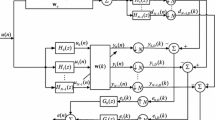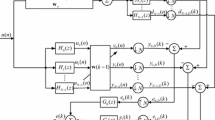Abstract
In this chapter, we investigate quantization effects in the fixed-point implementation of a subband AEC system based on a modified form of the FAP algorithm, referred to as FAP-RLS. The latter is similar in concept to the standard FAP, except for two modifications: use of sliding window RLS-type approach (instead of FRLS) to compute the normalized residual echo vector, for improved robustness in implementation; and simplified update of the residual echo vector. Subband decomposition is performed with modified uniform DFT filter banks, realized efficiently via the weighted overlap-add (WOA) technique for flexibility in oversampling. We characterize the main sources of errors in both the FAP-RLS and the DFT filter banks, and propose simple and effective solutions for stable operation of the subband AEC system. Our findings are supported experimentally.
Access this chapter
Tax calculation will be finalised at checkout
Purchases are for personal use only
Preview
Unable to display preview. Download preview PDF.
Similar content being viewed by others
References
J. M. Cioffi and T. Kailath, “Windowed fast transversal filters adaptive algorithms with normalization,” IEEE Trans. Acoust., Speech, Signal Processing, vol. 33, pp. 607–625, June 1985.
R. E. Crochiere and L. R. Rabiner, Multirate Digital Signal Processing. Prentice Hall, 1983.
S. C. Douglas, “Efficient approximate implementations of the fast affine projection algorithm using orthogonal transforms,” in Proc. IEEE ICASSP, Atlanta, U.S.A., 1996, pp. 1656–1659.
B. Farhang-Boroujeny and Z. Wang, “Adaptive filtering in subbands: design issues and experimental results for acoustic echo cancellation,” Signal Processing, vol. 61, pp. 213–223,1997.
S. L. Gay and S. Tavathia, “The fast affine projection algorithm,” in Proc. IEEE ICASSP, Detroit, U.S.A., 1995, pp. 3023–3026.
S. L. Gay, “Dynamically regularized fast RLS with application to echo cancellation,” in Proc. IEEE ICASSP, Atlanta, U.S.A., 1996, pp. 957–960.
A. Gilloire and M. Vetterli, “Adaptive filtering in subbands with critical sampling: analysis, experiments, and application to acoustic echo cancellation,” IEEE Trans. Signal Processing, vol. 40, pp. 1862–1875, Aug. 1992.
A. Gilloire, “Recent advances in adaptive filtering algorithms for acoustic echo cancellation,” in Proc. IWAENC, Roros, Norway, 1995, pp. 115–134.
Acoustic Echo Controllers. ITV-T Recommendation G.167, Feb. 1994.
Y. Kaneda, M. Tanaka, and J. Kojima, “An adaptive algorithm with fast convergence for multi-input sound control,” in Proc. ACTIVE, Newport Beach (CA), U.S.A., 1995, pp. 993–1004.
W. Kellermann, “Analysis and design of multirate systems for cancellation of acoustical echoes,” in Proc. IEEE ICASSP, New York, U.S.A., 1988, pp. 2570–2573.
Q. G. Liu, B. Champagne, and K. C. Ho, “On the use of a modified FAP algorithm in subbands for acoustic echo cancellation,” in Proc. 7th IEEE DSP Workshop, Loen, Norway, 1996, pp. 354–357.
Q. G. Liu, B. Champagne, and K. C. Ho, “Simple design of oversampled uniform DFT filter banks with applications to subband AEC,” submitted to Signal Processing, Nov. 1998. (See also: Q. G. Liu et al., “Simple design of filter banks…,” in Proc. IWAENC-97, pp. 132–135.)
K. Ozeki and T. Umeda, “An adaptive filtering algorithm using an orthogonal projection to an affine subspace and its properties,” Elec. and Comm. in Japan, vol. 67-A, pp. 126–132, Feb. 1984.
M. Tanaka, Y. Kaneda, S. Makino, and J. Kojima, “Fast projection algorithm and its step size control,” in Proc. IEEE ICASSP, Detroit, U.S.A., 1995, pp. 945–948.
M. H. Verhaegen, “Round-off error propagation in four generally-applicable, recursive, least-squares estimation schemes,” Automatica, vo1.25, pp. 437–444, 1989.
Author information
Authors and Affiliations
Editor information
Editors and Affiliations
Rights and permissions
Copyright information
© 2000 Springer Science+Business Media New York
About this chapter
Cite this chapter
Ghanassi, M., Champagne, B. (2000). Subband Acoustic Echo Cancellation Using the FAP-RLS Algorithm: Fixedpoint Implementation Issues. In: Gay, S.L., Benesty, J. (eds) Acoustic Signal Processing for Telecommunication. The Springer International Series in Engineering and Computer Science, vol 551. Springer, Boston, MA. https://doi.org/10.1007/978-1-4419-8644-3_3
Download citation
DOI: https://doi.org/10.1007/978-1-4419-8644-3_3
Publisher Name: Springer, Boston, MA
Print ISBN: 978-1-4613-4656-2
Online ISBN: 978-1-4419-8644-3
eBook Packages: Springer Book Archive




